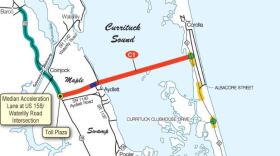The state Department of Transportation has the first of many approvals it needs for a new toll bridge to the northern Outer Banks.
The Mid-Currituck Bridge would run from the mainland to Corolla, where the nearest bridge is currently more than 20 miles away, but environmental groups have raised concerns about whether the price tag of nearly $500 million is worth it, and how the bridge might change the landscape of the Outer Banks.
On a good day, it takes residents of Corolla like Bob White an hour to get from the small town on the Outer Banks to a village on the mainland called Aydlett, just seven miles as the crow flies.
"We're pretty isolated," White said. "You're talking about probably 50 miles - something like that - from one side to the other to come around, now."
White is the chair of the Currituck County Board of Commissioners. He says a shortcut is worth it for residents and tourists who expect to wait for hours to get to and from the northern Outer Banks.
"That will cut off a huge portion of the drive down here, not only for the tourists, but the service industries that support us," White said.
The state Department of Transportation saw a need for a bridge across the Currituck Sound as early as 1975, but delays in funding and a long planning process put it on hold for decades. Now, the project has a favorable from the Federal Highway Administration.

There are still a number of hurdles to clear: land acquisition, environmental permits, and finalizing construction plans among others. But White says the bridge presents an opportunity to develop land along a new and improved corridor.
"On the mainland side, we could see a shift in the housing market and allow for some areas where people who work and support us can live closer to where they work," he said.
Kym Hunter, a senior attorney with the Southern Environmental Law Center, says that development is precisely her concern.
"We really don't think this project should be moving forward given concerns about sea level rise, resilience and then also just the financial cost," Hunter said.
Hunter believes the federal government is not fully considering the newest information on climate change.
"We're essentially building a bridge that in a few years will be stranded and encourage development in a lot of really sensitive areas that we need to preserve so we can adapt to the changing climate, and changing coastline," she said.
The North Carolina Turnpike Authority says the bridge's revenue from tolls will cover most of its costs, but the state will still be on the hook for about $173 million, and it is not yet clear how much it would cost drivers to make the crossing.








